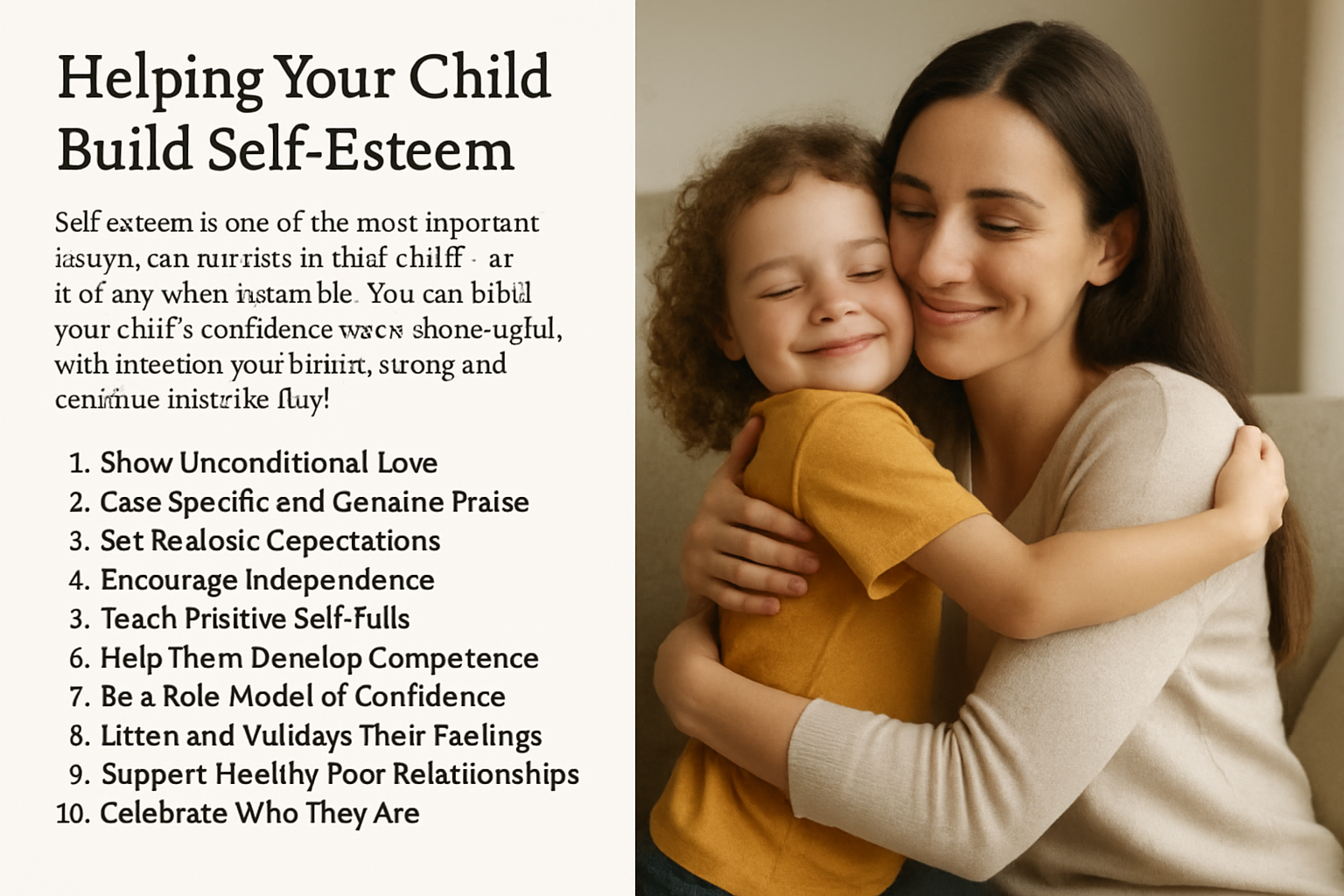Self-esteem is one of the most valuable gifts a parent can nurture in their child. It shapes how they see themselves, how they relate to others, and how they face challenges in life. A child with healthy self-esteem believes in their worth and capabilities — even when they stumble.
As a parent or caregiver, your words, actions, and reactions matter. You can help build your child’s confidence every single day, with intention and care.
1. Show Unconditional Love
Children need to know that they are loved for who they are, not for what they achieve. Unconditional love builds the foundation for confidence.
Say:
- “I love you no matter what.”
- “You’re important just because you’re you.”
- “Nothing will ever change how much I care about you.”
This deep sense of security supports your child’s emotional resilience.
2. Give Specific and Genuine Praise
Praise is powerful, but it should be thoughtful. Instead of overpraising or using vague compliments, focus on effort and growth.
Examples:
- “You worked hard on that drawing — I love how detailed it is.”
- “I noticed you helped your sister without being asked. That was kind.”
- “You stayed calm even when it was hard. That takes strength.”
This kind of praise helps children connect confidence to their actions, not to constant approval.
3. Set Realistic Expectations
Expecting too much (or too little) can damage a child’s self-image. Encourage your child to try their best, but make sure your expectations match their age and abilities.
Tips:
- Focus on progress, not perfection
- Avoid comparing your child to others
- Help them set achievable goals
When your child succeeds within those expectations, their sense of ability and self-worth grows.
4. Encourage Independence
Allowing your child to make choices, solve problems, and take age-appropriate risks teaches them that they are capable.
Try:
- Letting them dress themselves, even if it’s mismatched
- Allowing them to help in the kitchen
- Involving them in decision-making like planning activities
Mistakes are part of the learning process — encourage effort over outcome.
5. Teach Positive Self-Talk
Children often mirror how we talk about ourselves. Teach them to speak kindly to themselves and challenge negative thoughts.
Do this by:
- Modeling self-compassion: “I made a mistake, but I can fix it.”
- Encouraging them: “It’s okay to feel frustrated. You’re doing your best.”
- Teaching affirmations: “I am strong. I am kind. I can try again.”
This helps them develop an inner voice that supports rather than criticizes.
6. Help Them Develop Competence
Confidence grows from real experiences of success. Let your child develop skills by giving them responsibilities and letting them master tasks on their own.
Examples:
- Learning how to tie shoes
- Helping take care of a pet
- Practicing a musical instrument or sport
Celebrate their efforts, and allow them time to improve. Mastery takes patience.
7. Be a Role Model of Confidence
Children watch how you treat yourself. If you’re hard on yourself or avoid challenges, they may learn to do the same.
Instead:
- Talk about your own mistakes as learning moments
- Show persistence even when things are hard
- Share positive self-talk out loud
Let your actions show that it’s okay to try, fail, and try again.
8. Listen and Validate Their Feelings
When children feel heard and understood, their self-esteem grows. You don’t have to fix every problem — sometimes, just listening is enough.
Say:
- “That sounds really frustrating.”
- “I understand why you feel that way.”
- “Tell me more about what happened.”
Validation teaches them their emotions matter — and so do they.
9. Support Healthy Peer Relationships
Friends play a big role in how children see themselves. Help your child learn to choose kind, supportive peers and handle conflict respectfully.
Encourage:
- Open communication about friendships
- Assertiveness and boundary-setting
- Team sports or group activities to build social skills
Good relationships reinforce a sense of belonging and value.
10. Celebrate Who They Are
Every child is unique. Help them embrace what makes them different and special — not just what makes them “good” at something.
Ideas:
- Talk about their strengths and personality traits
- Create a “strengths jar” filled with positive notes
- Let them explore creative outlets like drawing, music, or writing
Let them know they are enough — exactly as they are.
Final Thought: Confidence Built Through Connection
Helping your child build self-esteem is not about shielding them from every failure or making life easy. It’s about being their anchor — consistently reminding them of their worth, supporting their growth, and helping them believe in themselves.
Through your love, guidance, and presence, your child can develop a strong inner foundation — one that will carry them through childhood, adolescence, and into adulthood with courage and confidence.
